Effective Reporting and Record Keeping: Health and Social Care Report
VerifiedAdded on 2023/02/02
|19
|1560
|62
Report
AI Summary
This report provides a comprehensive overview of effective reporting and record-keeping practices within healthcare settings, emphasizing the significance of accuracy, confidentiality, and adherence to legal frameworks. It delves into the statutory requirements, including GDPR and Freedom of Information Act, and the role of regulatory bodies in ensuring compliance. The report explores data storage processes, both manual and electronic, within healthcare organizations like Surrey and Sussex NHS Hospital, highlighting the importance of maintaining patient privacy and data security. It also examines the consequences of non-compliance, the sharing of information within and outside healthcare settings, and the internal and external requirements for recording information. The report also details the current processes for storing and sharing records. The report concludes with a discussion of the importance of accurate record keeping in healthcare and the impact on patient trust and care.
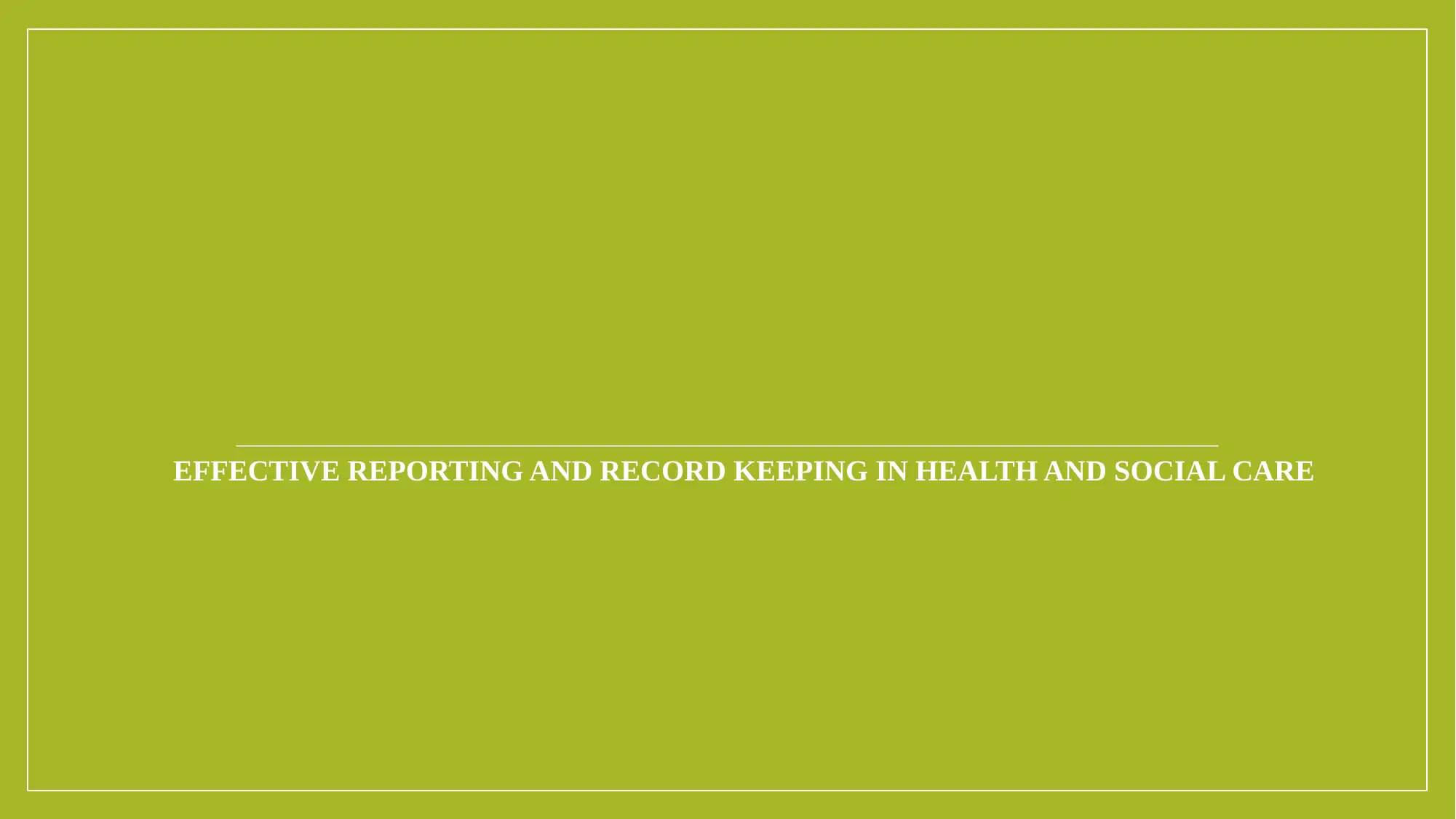
EFFECTIVE REPORTING AND RECORD KEEPING IN HEALTH AND SOCIAL CARE
Paraphrase This Document
Need a fresh take? Get an instant paraphrase of this document with our AI Paraphraser
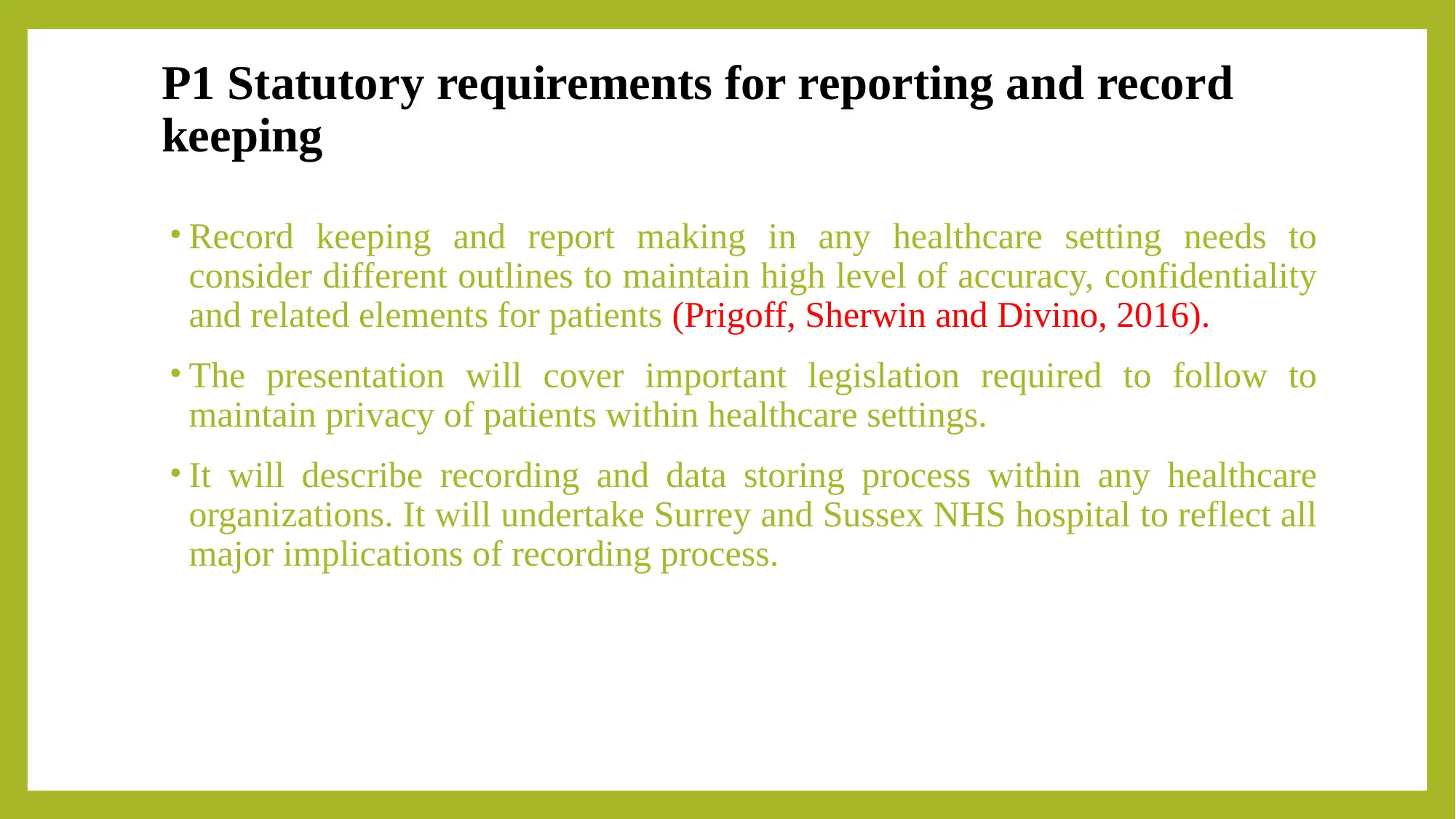
P1 Statutory requirements for reporting and record
keeping
• Record keeping and report making in any healthcare setting needs to
consider different outlines to maintain high level of accuracy, confidentiality
and related elements for patients (Prigoff, Sherwin and Divino, 2016).
• The presentation will cover important legislation required to follow to
maintain privacy of patients within healthcare settings.
• It will describe recording and data storing process within any healthcare
organizations. It will undertake Surrey and Sussex NHS hospital to reflect all
major implications of recording process.
keeping
• Record keeping and report making in any healthcare setting needs to
consider different outlines to maintain high level of accuracy, confidentiality
and related elements for patients (Prigoff, Sherwin and Divino, 2016).
• The presentation will cover important legislation required to follow to
maintain privacy of patients within healthcare settings.
• It will describe recording and data storing process within any healthcare
organizations. It will undertake Surrey and Sussex NHS hospital to reflect all
major implications of recording process.
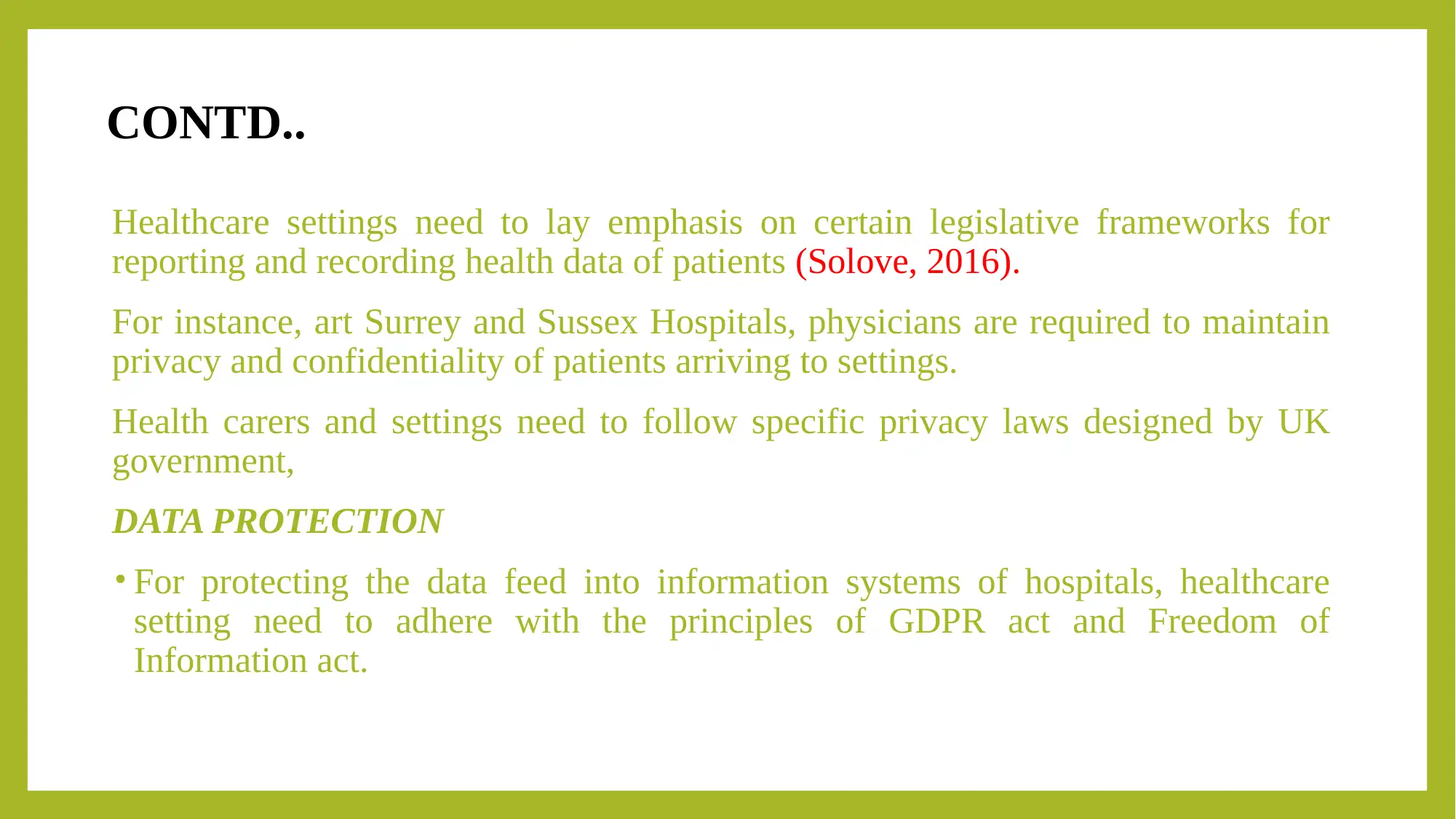
CONTD..
Healthcare settings need to lay emphasis on certain legislative frameworks for
reporting and recording health data of patients (Solove, 2016).
For instance, art Surrey and Sussex Hospitals, physicians are required to maintain
privacy and confidentiality of patients arriving to settings.
Health carers and settings need to follow specific privacy laws designed by UK
government,
DATA PROTECTION
• For protecting the data feed into information systems of hospitals, healthcare
setting need to adhere with the principles of GDPR act and Freedom of
Information act.
Healthcare settings need to lay emphasis on certain legislative frameworks for
reporting and recording health data of patients (Solove, 2016).
For instance, art Surrey and Sussex Hospitals, physicians are required to maintain
privacy and confidentiality of patients arriving to settings.
Health carers and settings need to follow specific privacy laws designed by UK
government,
DATA PROTECTION
• For protecting the data feed into information systems of hospitals, healthcare
setting need to adhere with the principles of GDPR act and Freedom of
Information act.
⊘ This is a preview!⊘
Do you want full access?
Subscribe today to unlock all pages.

Trusted by 1+ million students worldwide
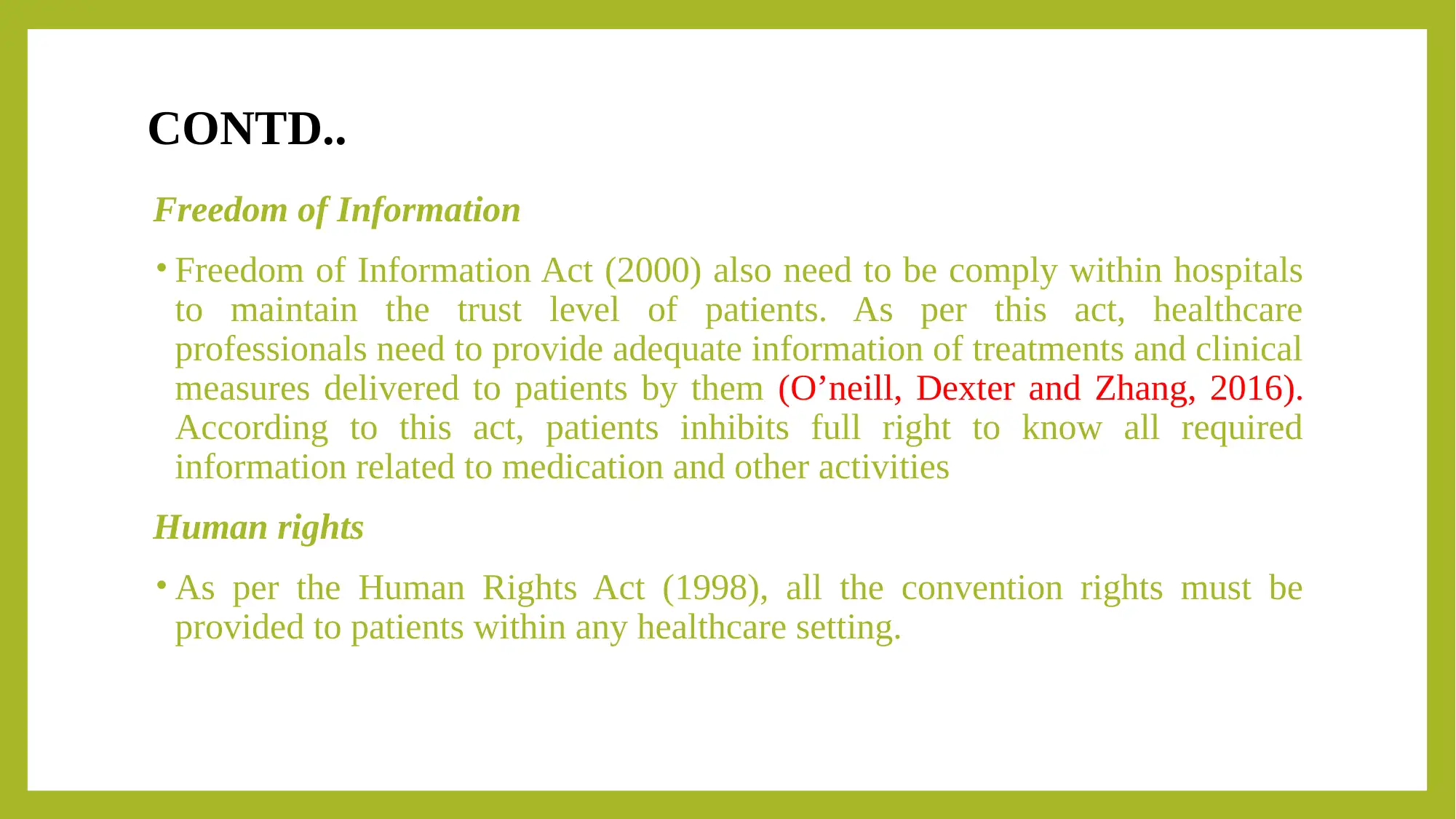
CONTD..
Freedom of Information
• Freedom of Information Act (2000) also need to be comply within hospitals
to maintain the trust level of patients. As per this act, healthcare
professionals need to provide adequate information of treatments and clinical
measures delivered to patients by them (O’neill, Dexter and Zhang, 2016).
According to this act, patients inhibits full right to know all required
information related to medication and other activities
Human rights
• As per the Human Rights Act (1998), all the convention rights must be
provided to patients within any healthcare setting.
Freedom of Information
• Freedom of Information Act (2000) also need to be comply within hospitals
to maintain the trust level of patients. As per this act, healthcare
professionals need to provide adequate information of treatments and clinical
measures delivered to patients by them (O’neill, Dexter and Zhang, 2016).
According to this act, patients inhibits full right to know all required
information related to medication and other activities
Human rights
• As per the Human Rights Act (1998), all the convention rights must be
provided to patients within any healthcare setting.
Paraphrase This Document
Need a fresh take? Get an instant paraphrase of this document with our AI Paraphraser
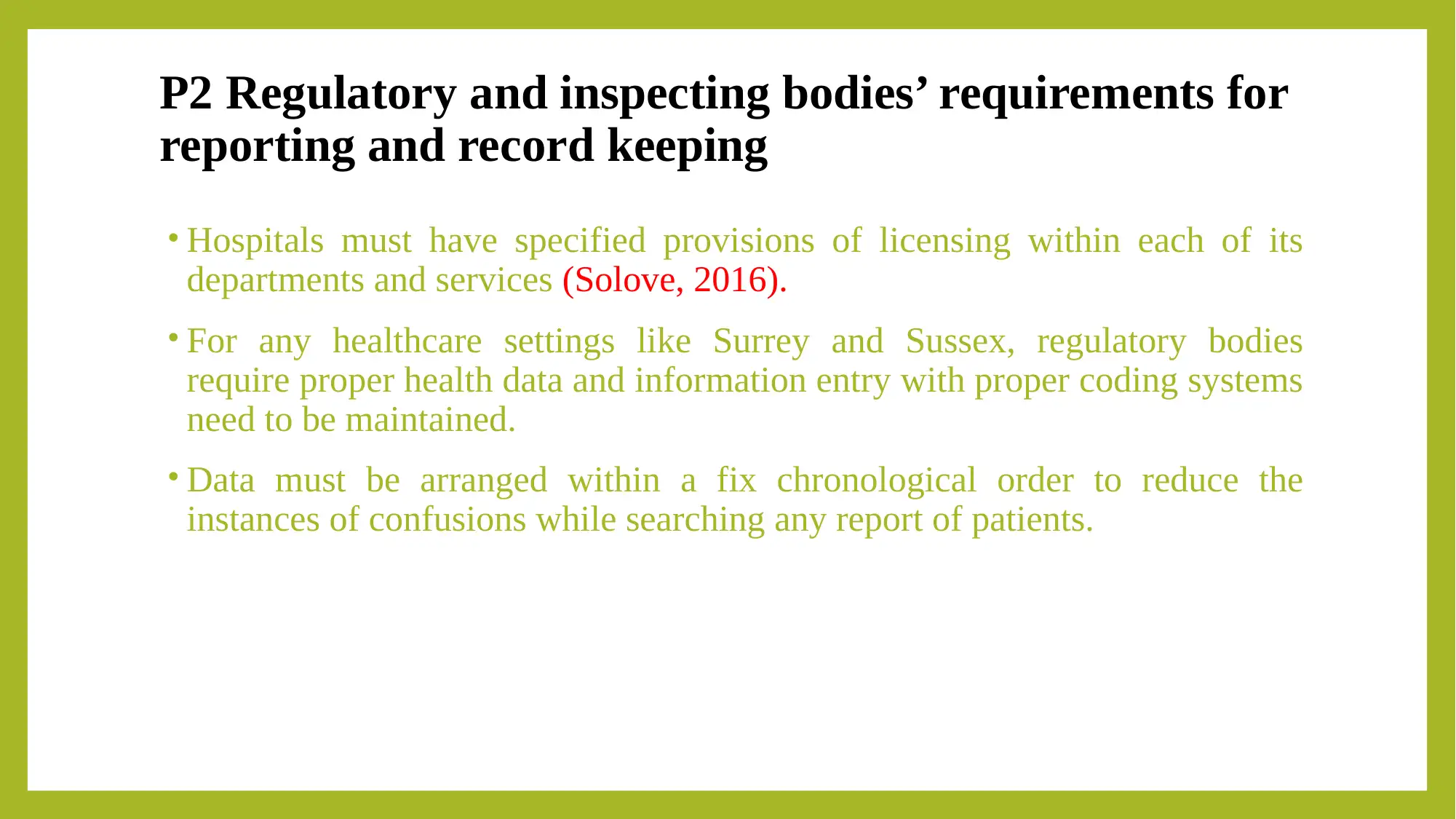
P2 Regulatory and inspecting bodies’ requirements for
reporting and record keeping
• Hospitals must have specified provisions of licensing within each of its
departments and services (Solove, 2016).
• For any healthcare settings like Surrey and Sussex, regulatory bodies
require proper health data and information entry with proper coding systems
need to be maintained.
• Data must be arranged within a fix chronological order to reduce the
instances of confusions while searching any report of patients.
reporting and record keeping
• Hospitals must have specified provisions of licensing within each of its
departments and services (Solove, 2016).
• For any healthcare settings like Surrey and Sussex, regulatory bodies
require proper health data and information entry with proper coding systems
need to be maintained.
• Data must be arranged within a fix chronological order to reduce the
instances of confusions while searching any report of patients.
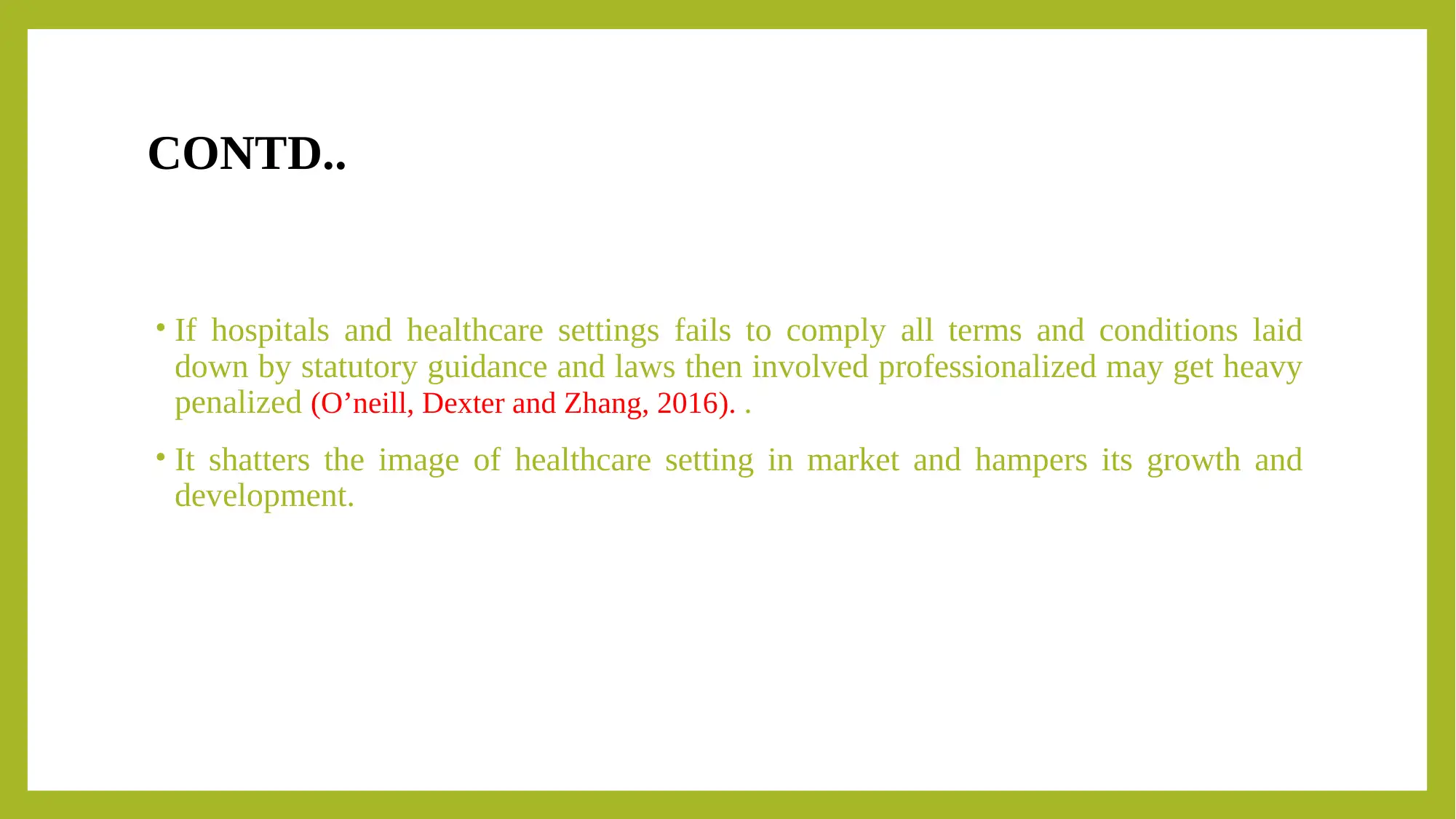
CONTD..
• If hospitals and healthcare settings fails to comply all terms and conditions laid
down by statutory guidance and laws then involved professionalized may get heavy
penalized (O’neill, Dexter and Zhang, 2016). .
• It shatters the image of healthcare setting in market and hampers its growth and
development.
• If hospitals and healthcare settings fails to comply all terms and conditions laid
down by statutory guidance and laws then involved professionalized may get heavy
penalized (O’neill, Dexter and Zhang, 2016). .
• It shatters the image of healthcare setting in market and hampers its growth and
development.
⊘ This is a preview!⊘
Do you want full access?
Subscribe today to unlock all pages.

Trusted by 1+ million students worldwide
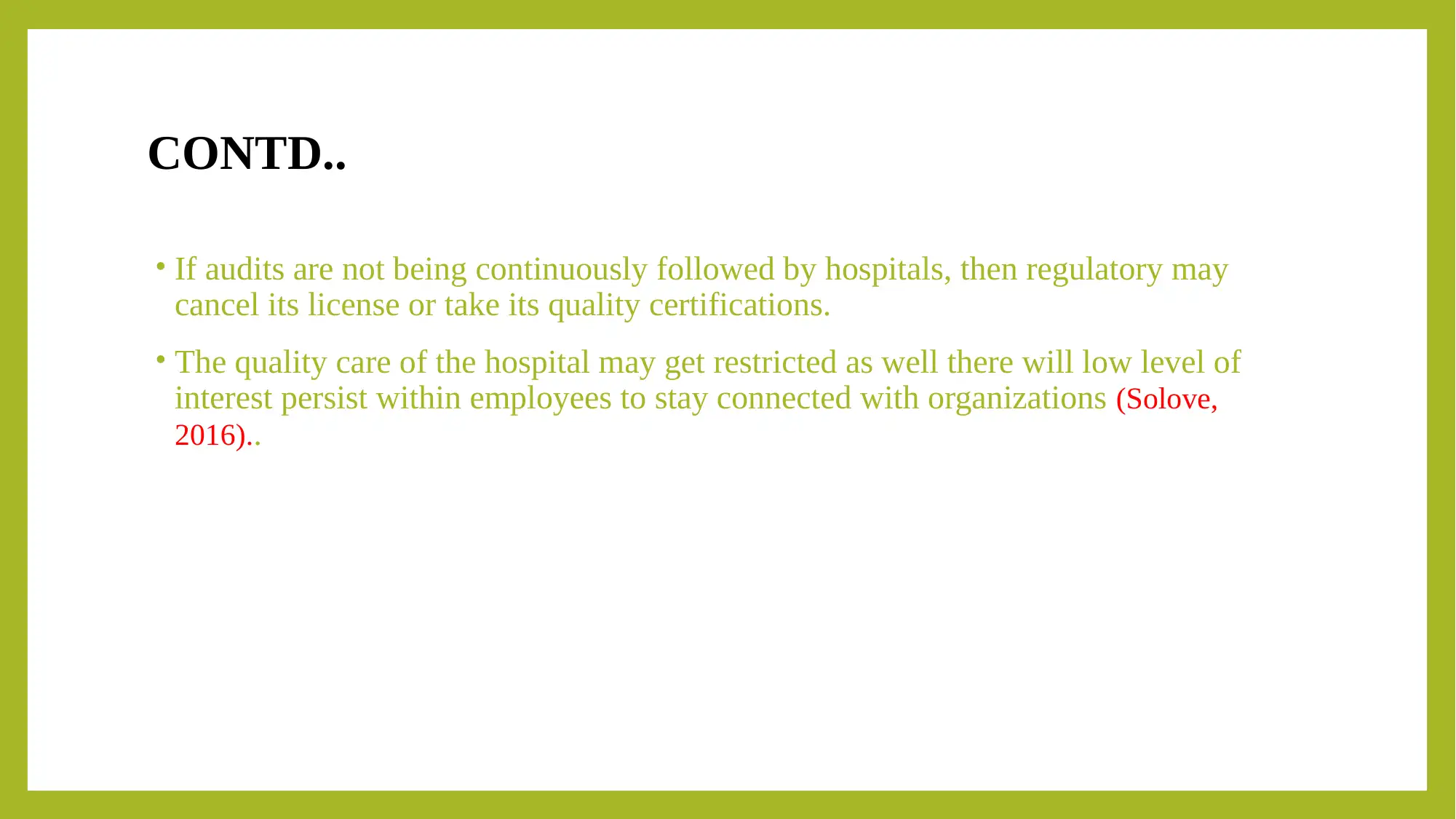
CONTD..
• If audits are not being continuously followed by hospitals, then regulatory may
cancel its license or take its quality certifications.
• The quality care of the hospital may get restricted as well there will low level of
interest persist within employees to stay connected with organizations (Solove,
2016)..
• If audits are not being continuously followed by hospitals, then regulatory may
cancel its license or take its quality certifications.
• The quality care of the hospital may get restricted as well there will low level of
interest persist within employees to stay connected with organizations (Solove,
2016)..
Paraphrase This Document
Need a fresh take? Get an instant paraphrase of this document with our AI Paraphraser
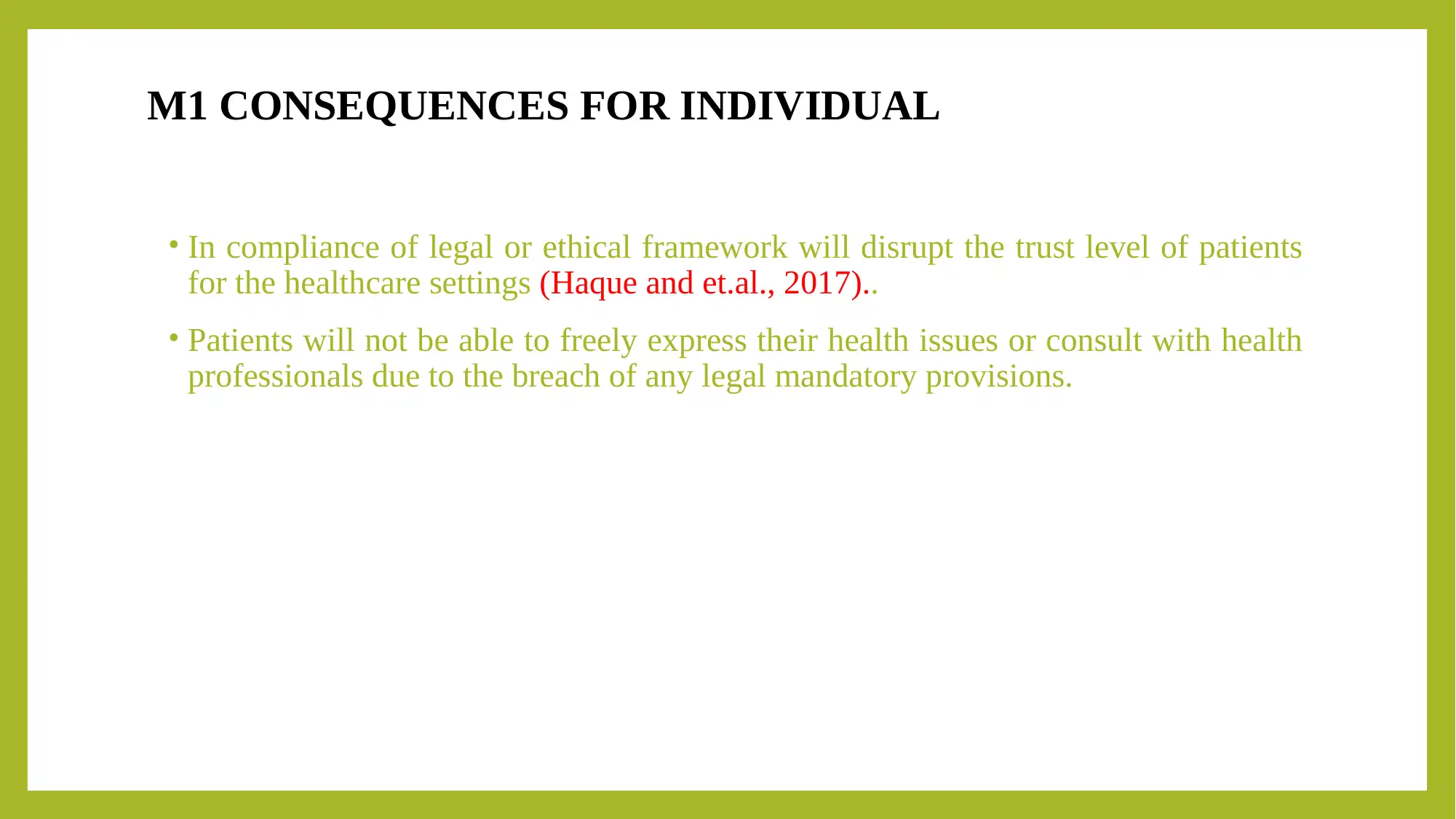
M1 CONSEQUENCES FOR INDIVIDUAL
• In compliance of legal or ethical framework will disrupt the trust level of patients
for the healthcare settings (Haque and et.al., 2017)..
• Patients will not be able to freely express their health issues or consult with health
professionals due to the breach of any legal mandatory provisions.
• In compliance of legal or ethical framework will disrupt the trust level of patients
for the healthcare settings (Haque and et.al., 2017)..
• Patients will not be able to freely express their health issues or consult with health
professionals due to the breach of any legal mandatory provisions.
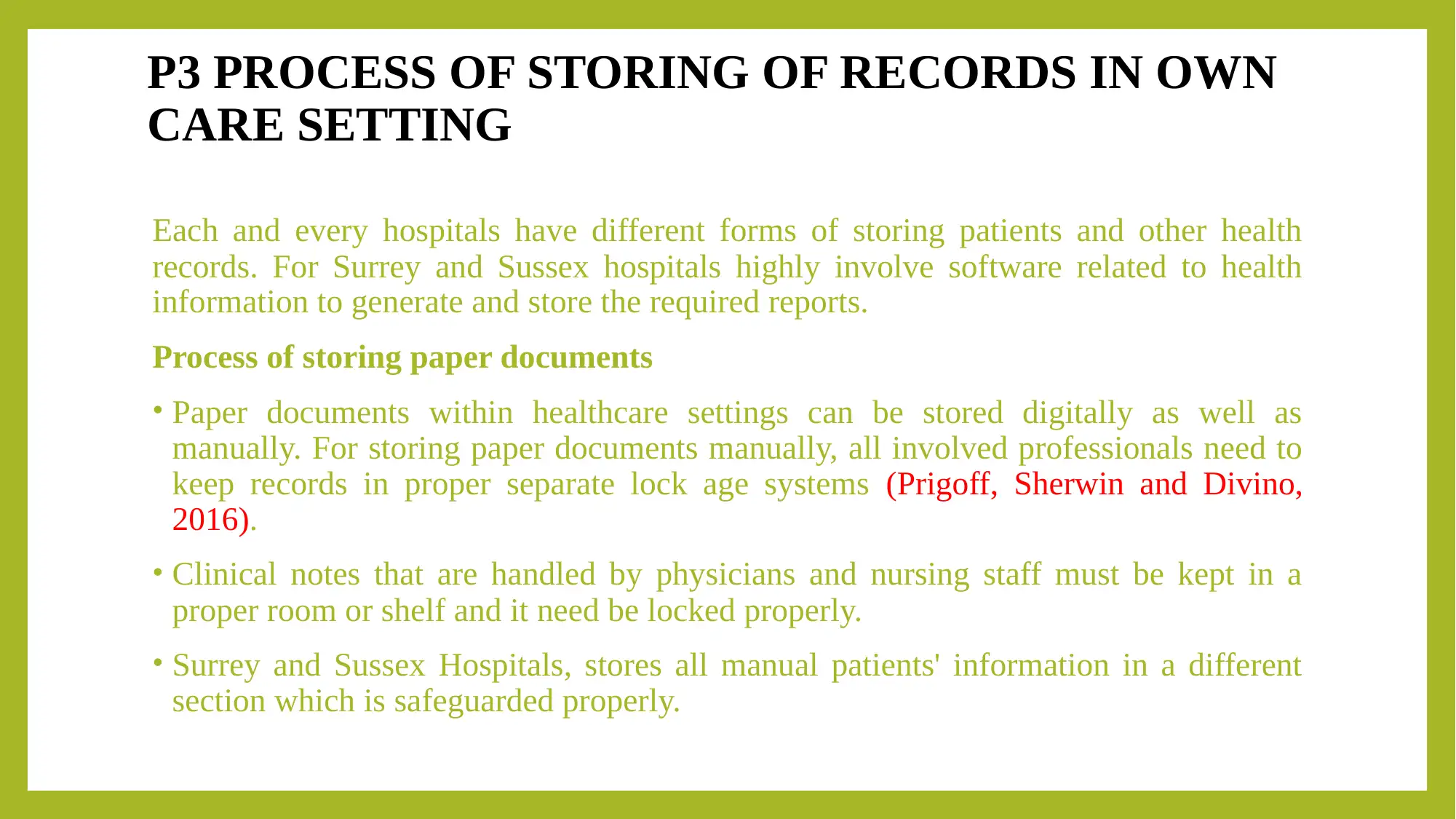
P3 PROCESS OF STORING OF RECORDS IN OWN
CARE SETTING
Each and every hospitals have different forms of storing patients and other health
records. For Surrey and Sussex hospitals highly involve software related to health
information to generate and store the required reports.
Process of storing paper documents
• Paper documents within healthcare settings can be stored digitally as well as
manually. For storing paper documents manually, all involved professionals need to
keep records in proper separate lock age systems (Prigoff, Sherwin and Divino,
2016).
• Clinical notes that are handled by physicians and nursing staff must be kept in a
proper room or shelf and it need be locked properly.
• Surrey and Sussex Hospitals, stores all manual patients' information in a different
section which is safeguarded properly.
CARE SETTING
Each and every hospitals have different forms of storing patients and other health
records. For Surrey and Sussex hospitals highly involve software related to health
information to generate and store the required reports.
Process of storing paper documents
• Paper documents within healthcare settings can be stored digitally as well as
manually. For storing paper documents manually, all involved professionals need to
keep records in proper separate lock age systems (Prigoff, Sherwin and Divino,
2016).
• Clinical notes that are handled by physicians and nursing staff must be kept in a
proper room or shelf and it need be locked properly.
• Surrey and Sussex Hospitals, stores all manual patients' information in a different
section which is safeguarded properly.
⊘ This is a preview!⊘
Do you want full access?
Subscribe today to unlock all pages.

Trusted by 1+ million students worldwide
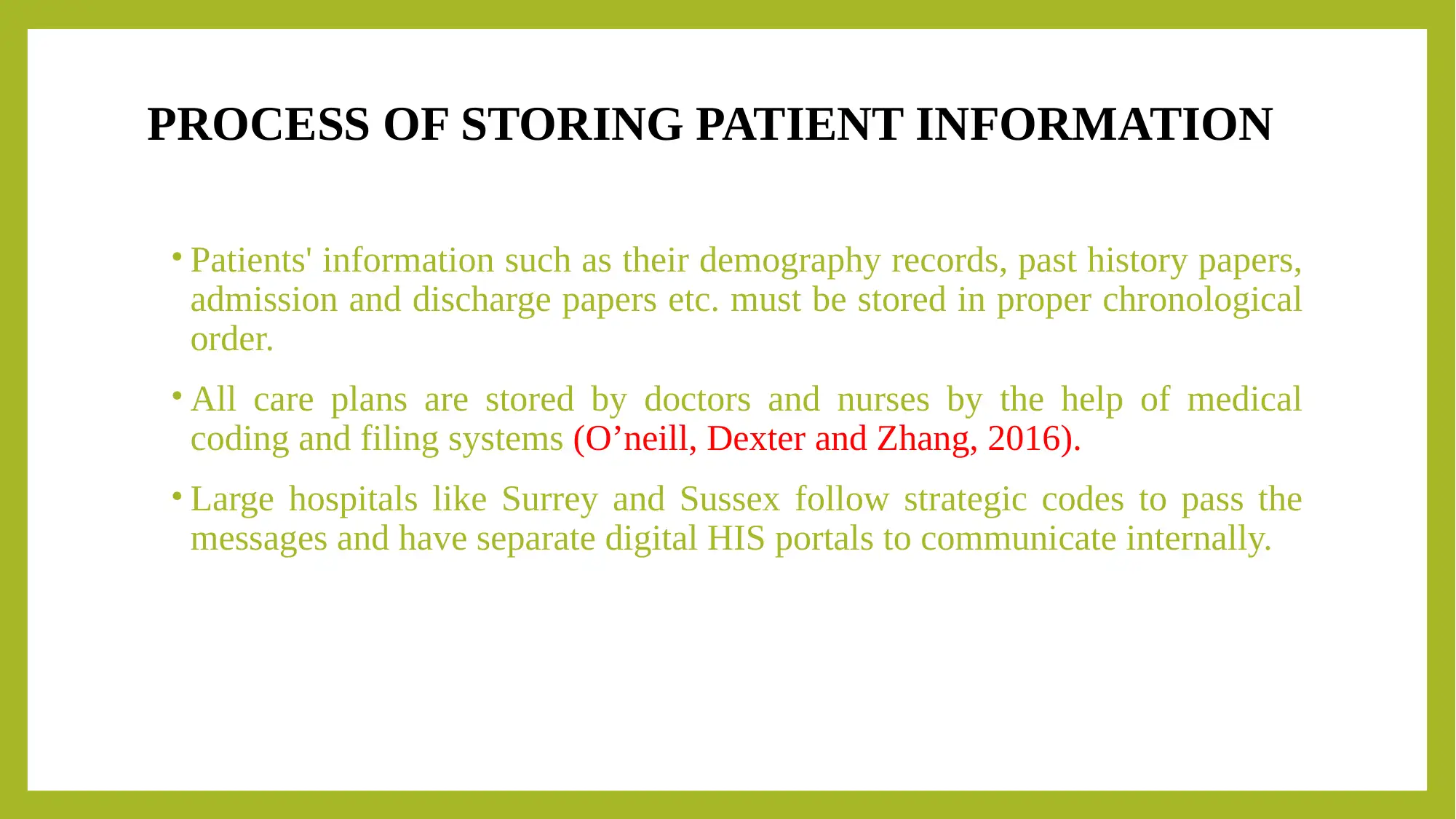
PROCESS OF STORING PATIENT INFORMATION
• Patients' information such as their demography records, past history papers,
admission and discharge papers etc. must be stored in proper chronological
order.
• All care plans are stored by doctors and nurses by the help of medical
coding and filing systems (O’neill, Dexter and Zhang, 2016).
• Large hospitals like Surrey and Sussex follow strategic codes to pass the
messages and have separate digital HIS portals to communicate internally.
• Patients' information such as their demography records, past history papers,
admission and discharge papers etc. must be stored in proper chronological
order.
• All care plans are stored by doctors and nurses by the help of medical
coding and filing systems (O’neill, Dexter and Zhang, 2016).
• Large hospitals like Surrey and Sussex follow strategic codes to pass the
messages and have separate digital HIS portals to communicate internally.
Paraphrase This Document
Need a fresh take? Get an instant paraphrase of this document with our AI Paraphraser
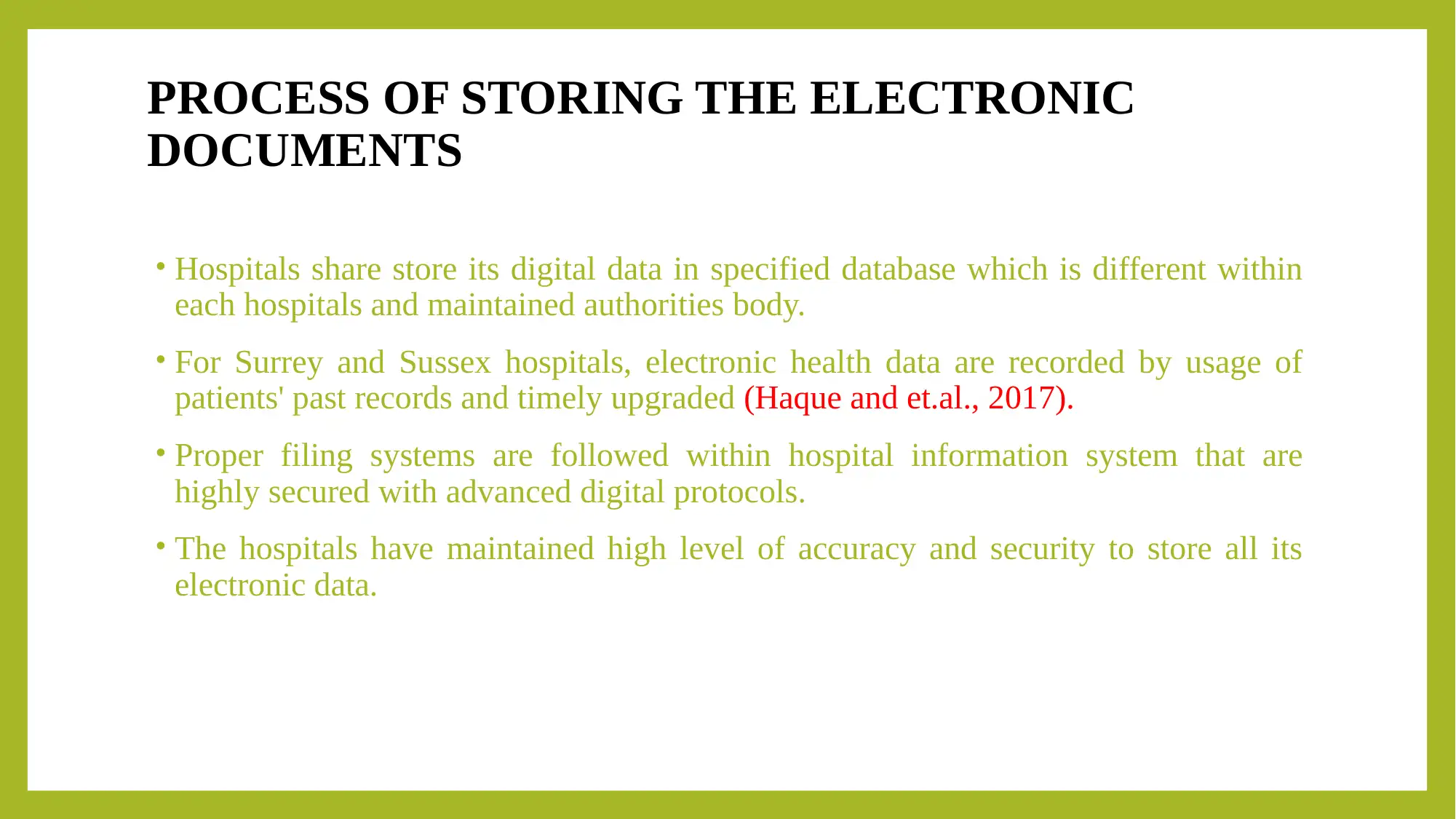
PROCESS OF STORING THE ELECTRONIC
DOCUMENTS
• Hospitals share store its digital data in specified database which is different within
each hospitals and maintained authorities body.
• For Surrey and Sussex hospitals, electronic health data are recorded by usage of
patients' past records and timely upgraded (Haque and et.al., 2017).
• Proper filing systems are followed within hospital information system that are
highly secured with advanced digital protocols.
• The hospitals have maintained high level of accuracy and security to store all its
electronic data.
DOCUMENTS
• Hospitals share store its digital data in specified database which is different within
each hospitals and maintained authorities body.
• For Surrey and Sussex hospitals, electronic health data are recorded by usage of
patients' past records and timely upgraded (Haque and et.al., 2017).
• Proper filing systems are followed within hospital information system that are
highly secured with advanced digital protocols.
• The hospitals have maintained high level of accuracy and security to store all its
electronic data.
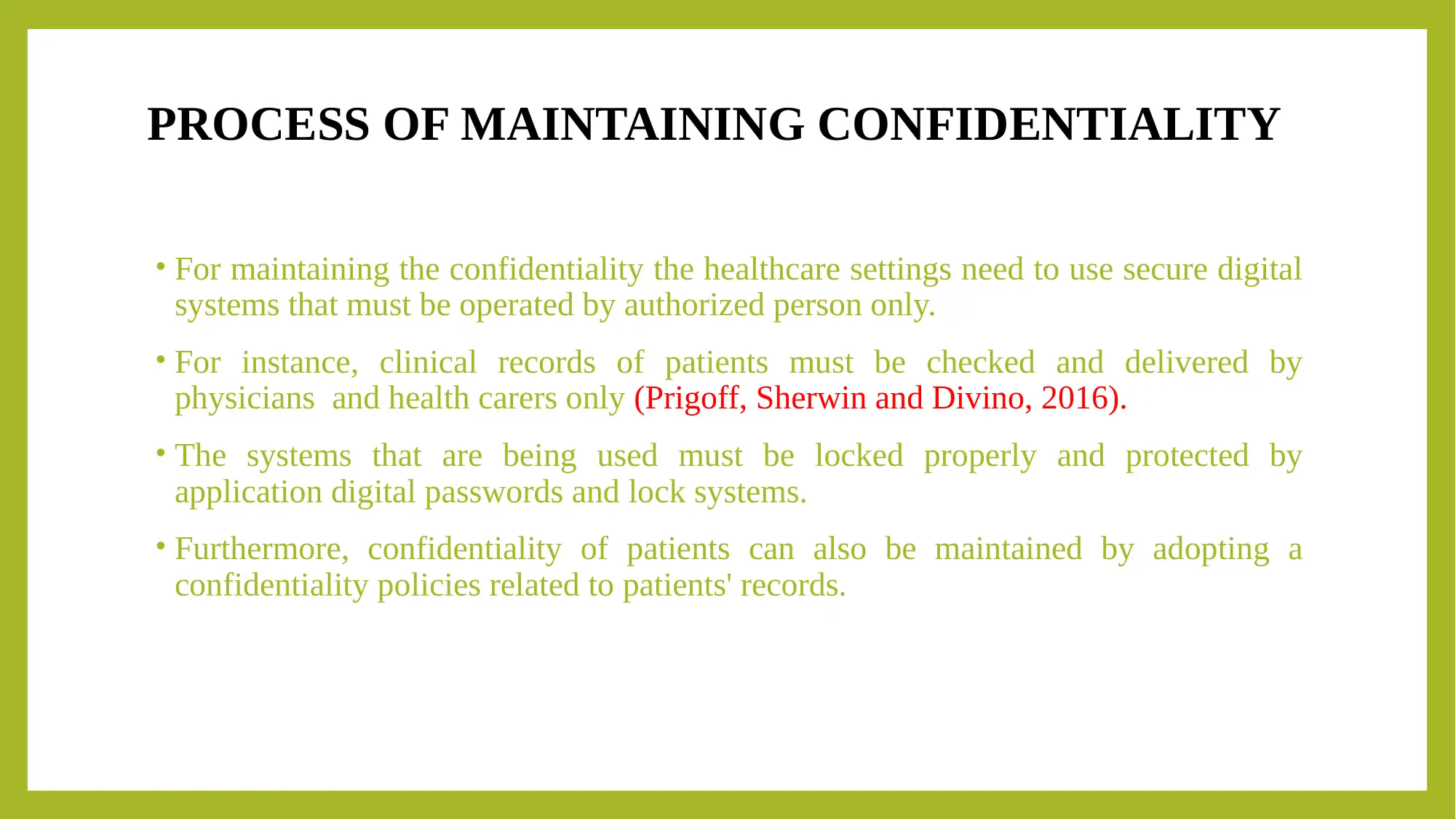
PROCESS OF MAINTAINING CONFIDENTIALITY
• For maintaining the confidentiality the healthcare settings need to use secure digital
systems that must be operated by authorized person only.
• For instance, clinical records of patients must be checked and delivered by
physicians and health carers only (Prigoff, Sherwin and Divino, 2016).
• The systems that are being used must be locked properly and protected by
application digital passwords and lock systems.
• Furthermore, confidentiality of patients can also be maintained by adopting a
confidentiality policies related to patients' records.
• For maintaining the confidentiality the healthcare settings need to use secure digital
systems that must be operated by authorized person only.
• For instance, clinical records of patients must be checked and delivered by
physicians and health carers only (Prigoff, Sherwin and Divino, 2016).
• The systems that are being used must be locked properly and protected by
application digital passwords and lock systems.
• Furthermore, confidentiality of patients can also be maintained by adopting a
confidentiality policies related to patients' records.
⊘ This is a preview!⊘
Do you want full access?
Subscribe today to unlock all pages.

Trusted by 1+ million students worldwide
1 out of 19
Related Documents
Your All-in-One AI-Powered Toolkit for Academic Success.
+13062052269
info@desklib.com
Available 24*7 on WhatsApp / Email
![[object Object]](/_next/static/media/star-bottom.7253800d.svg)
Unlock your academic potential
Copyright © 2020–2026 A2Z Services. All Rights Reserved. Developed and managed by ZUCOL.





